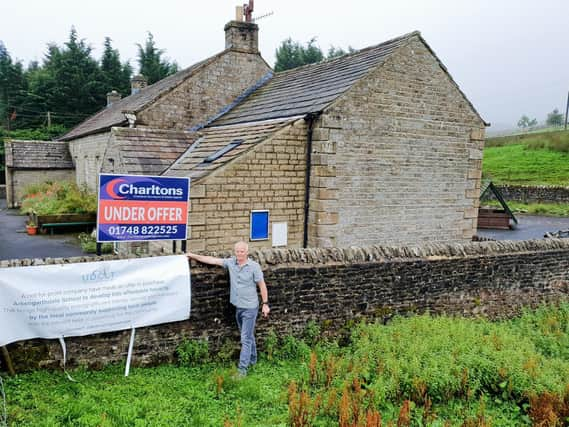Disappointment over Church of England's decision to sell school in flood-hit Dales village to the highest bidder


The Upper Dales Community Land Trust have criticised the Church of England for allowing the sale of the former Arkengarthdale C of E Primary School, which closed last year after pupil numbers dwindled to just five, on the open market.
They claim the disposal of the historic property goes against the aims of a recent Church commission which recommended that redundant ecclesiastical buildings could be used to relieve the housing crisis in rural areas.
Advertisement
Hide AdAdvertisement
Hide AdTheir fight has been supported by Chancellor of the Exchequer Rishi Sunak, whose Richmond constituency includes Arkengarthdale. Mr Sunak said that the building's availability was a 'once in a lifetime' opportunity to secure an affordable housing scheme for an area where few sites present themselves for development.
Arkengarthdale - which was badly hit by the flash floods of July 2019 - has experienced population decline in recent decades as young families have become priced out of the village, where an average property now sells for £300,000.
As a result, the UDCLT identified the old school as ideal for conversion into affordable homes for ownership by local people who wish to stay in the area.
Their plans were thwarted when the local church council instead put the building up for sale and it was snapped up for £185,000 by a purchaser whose identity is unknown.
Advertisement
Hide AdAdvertisement
Hide AdThey have even called on the Archbishop of Canterbury, Justin Welby, to intervene in a decision they feel is hypocritical.
Swaledale with Arkengarthdale Parochial Church Council have owned the building since 1933, when they bought it from a retired army officer for just £325. The parish council, Yorkshire Dales National Park Authority and Richmondshire District Council were all supportive of plans to convert it into three two-bedroom and one one-bedroom homes for younger families.
The local council even pledged £150,000 from their own affordable housing fund to purchase the site, based on an independent assessment of its value.
Yet the parochial council were instructed that they had a legal duty to sell the land to the highest bidder, and accepted an offer that was £35,000 more than the valuation.
Advertisement
Hide AdAdvertisement
Hide AdUpper Dales Community Land Trust chair Stephen Stubbs, 61, who was once a pupil at the school, believes the Church has a moral duty to support the sustainability of the local community, especially in light of the floods and Covid-19 pandemic.
“The Church has taken a legal view but not considered its moral obligation to the people of Arkengarthdale. The school was bought through local people for the benefit of local people.
“We are extremely concerned. The school building is the last chance to provide affordable housing to secure a more sustainable and brighter future for the community of Arkengarthdale.
“The decision seems to contradict the aims of the Archbishop of Canterbury’s commission to examine housing, church and community, which states: 'We have land and resources that can be used to help meet the need for more affordable housing'.
Advertisement
Hide AdAdvertisement
Hide Ad"In this case, it appears his vision to encourage and actively help affordable housing to be created from their estate is not borne out by reality as the exact opposite is happening, with his prophecy being sacrificed in the interests of short-term profit.”
There are now only 199 people living in Arkengarthdale - a 14 per decline in seven years. Over sixty per cent are aged over 60, and just 14 per cent are under 30. Of the 174 properties in the area, 105 are now second homes or holiday lets. In the past two years, eight homes have sold for an average of £363,200.
County and district councillor Coun Yvonne Peacock added: “Without homes for our local families, how can our Dales have a sustainable future? We need people to live and work in Arkengarthdale to support our businesses, farming and tourism.
“I am so very disappointed our offer to purchase the school was rejected. Our proposal provided an ideal way forward to provide affordable homes and preserve a community for future generations.”
Advertisement
Hide AdAdvertisement
Hide AdMr Stubbs has now written directly to the Archbishop of Canterbury in appeal and Mr Sunak MP has written to the vice-chair of the parochial church council, Andrew Bedford, to ask for the decision to be reconsidered.
“We had hoped that after last year’s devastating floods and the current Covid restrictions, Arkengarthdale and indeed the Dales in general would have some good news, a sort of flood/Covid resurgence story,” Mr Stubbs added.
Questions remain over the future use of the building, which will come under intense scrutiny through stringent planning regulations and likely local objections. There are also issues surrounding how money raised by the sale could be used. A trust exists which ring fences any proceeds for ecclesiastical use in the parish, something also spelled out in the original deeds.
However the local vicar, the Reverend Caroline Hewlett, said that the parochial council's 'hands were tied' over the deal due to the legal restrictions. She also said there had been over 60 expressions of interest from potential buyers and that the Upper Dales Community Land Trust had been approached to see if they could increase their offer.
Advertisement
Hide AdAdvertisement
Hide AdA spokesperson for the Diocese of Leeds said: “The Anglican Diocese of Leeds is aware of the circumstances and the decision concerning the sale of the former school building taken by Swaledale and Arkengarthdale Parochial Church Council, which has acted in accordance with the duties and requirements imposed upon trustees by charity law.”